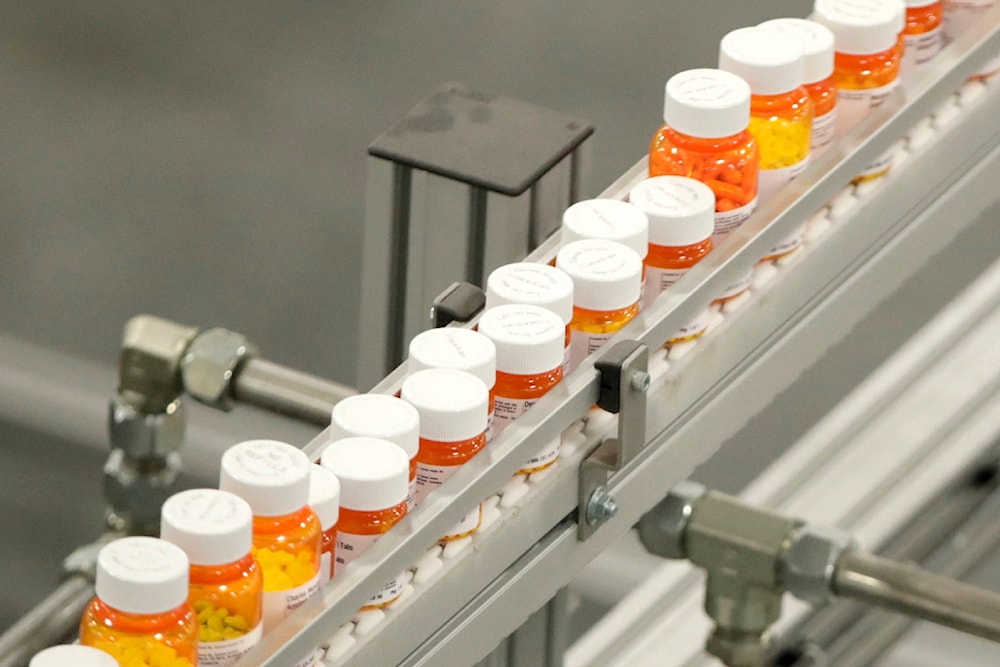UK struck by medicine shortages in NHS
The United Kingdom is being battered by medicines shortages caused by numerous issues ranging from the Ukraine war to Brexit ramifications.
-

In this July 10, 2018 file photo, bottles of medications ride on a belt at a mail-in pharmacy warehouse in Florence, New Jersey. (AP)
Patients in the United Kingdom are grappling with a new battle for healthcare as a medicine shortage sweeps the National Health Service (NHS), with the number of medicines in short supply doubling in two years, as per The Guardian.
Pharmacists report that vital treatments for conditions like epilepsy, cancer, schizophrenia, and diabetes are highly affected by the crisis attributed to paramount inflation and devaluation of the British pound since Brexit, which hinders the government's ability to import goods.
This unprecedented situation leaves countless patients in limbo, forced to endure delays, anxiety, and even potential health deterioration amidst the struggle to access essential medications, the British media outlet said.
Breast Cancer Now chief executive Delyth Morgan paints a grim picture, detailing patient accounts of difficulties sourcing hormone treatments like letrozole, anastrozole, and tamoxifen. "Tracking down a treatment... is an added burden for patients at an already difficult time," she says.
Patients, pharmacists to fend for themselves
Douglas Twenefour, head of care at Diabetes UK, echoes the concerns, lamenting the impact on type 2 diabetics struggling to access GLP-1 medications. "These shortages will likely last for at least the rest of this year," he warns, which would leave many up against the ropes with inadequate treatment options.
Another issue exacerbating the scarcity of drugs is Downing Street's policy of taxing drug manufacturers, which is further draining supply, creating disincentives for companies to invest in the UK market. Other factors include supply chain disruptions and the Ukraine war, The Guardian said.
Janet Morrison, chief executive of Community Pharmacy England, paints a dire picture of pharmacies inundated with the fallout. "Pharmacies are having to spend... an extra 11 hours a week tracking down medicines," she reveals.
The Department of Health and Social Care (DHSC) claims it's working to mitigate the shortages, citing established procedures and close collaboration with industry and the NHS. However, pharmacists like Morrison argue that price concessions, while a temporary fix, are merely a symptom of a much deeper issue.
"They show the system is responding, but they are a symptom of the squeeze that brings disruptions and shortages," she emphasizes.
Inadequate health policy
The UK has long been embroiled in issues surrounding its inadequate health policy, with a study conducted by the Institute of Health Equity at University College London unveiling a staggering toll of over a million premature deaths taking place in England over the course of a decade.
The research, titled Health Inequalities, Lives Cut Short, attributes this alarming figure to a combination of poverty, austerity measures, and the impact of the COVID-19 pandemic.
Between 2011 and 2019, 1,062,334 individuals died earlier than they would have if they were living in areas where the richest 10% of the population did. Additionally, the study reported 151,615 premature deaths in 2020, with a notable spike attributed to the COVID-19 pandemic.
Professor Peter Goldblatt, the study's author, directly linked 148,000 deaths to austerity measures implemented since 2010, comparing them to earlier levels. The findings underscore the stark economic and social inequalities leading to premature deaths, primarily from cancer, heart problems, and other diseases affecting the most vulnerable populations.
NHS left to fall apart
This comes as England's public health provider faces mounting crises, induced by a lack of government funding, culminating in low wages, a lack of equipment, and worsening services.
In September 2023, data revealed that approximately two million patients and 43,000 NHS staff are facing risks due to deteriorating concrete conditions in hospital buildings, The Telegraph reported.
According to information from the Liberal Democrats, seven hospitals, including four with widespread issues of crumbling reinforced autoclaved aerated concrete (RAAC), cater to a total of 1.94 million people in various communities. Among the hospital staff are 5,000 doctors, 11,500 nurses, and midwives, all working in environments that NHS leaders labeled as posing "a major risk to patient and staff safety."

 4 Min Read
4 Min Read








